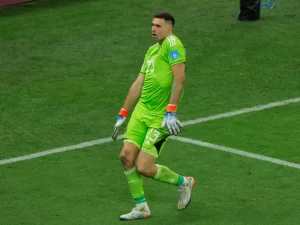FIFA’s Controversial Ban on Emiliano Martínez: A Turning Point for Sportsmanship in Football?


FIFA’s Controversial Ban on Emiliano Martínez: A Turning Point for Sportsmanship in Football?
Football, a game that sparks joy and passion, has always been riddled with moments of controversy. But few events have ignited as much debate as FIFA’s recent decision to ban Argentina’s star goalkeeper, Emiliano Martínez, for what the organization deemed “offensive behavior.” For fans and critics alike, the ban poses questions that go beyond the pitch. Is this a fair consequence for unsportsmanlike conduct, or does it represent an overreach by football’s governing body? Let’s delve into the whirlwind surrounding Martínez’s ban and explore its wider implications for the beautiful game.
Every controversy begins with a flashpoint, and for Emiliano Martínez, that moment occurred during the 2022 World Cup. The Argentinian goalkeeper, known for his fiery persona, made headlines not just for his incredible saves but for a provocative gesture following Argentina’s win. In the midst of the post-match celebrations, Martínez held his Golden Glove trophy in a manner that many deemed inappropriate. While his act was seen as a jest by some, others—including FIFA—viewed it as disrespectful and unsportsmanlike.
However, the real tipping point came later when Martínez reportedly directed taunting comments at his opponents, compounding the initial offense. FIFA’s disciplinary committee, citing both the gesture and his remarks, moved swiftly to sanction the goalkeeper, resulting in a multi-game suspension. But was this a fitting punishment for the actions in question? To answer that, we must take a closer look at the broader context.
Football is more than just a physical competition; it’s a display of character, teamwork, and respect. Sportsmanship has long been a central value in the sport, enshrined in the rules and expectations governing player conduct on and off the pitch. Players are often looked up to as role models, and their behavior can set the tone for millions of fans, young and old alike.
In Martínez’s case, his post-match antics cut to the heart of what FIFA sees as unsporting behavior. But in a sport where emotions often run high, the question arises: to what extent should passion and personality be curbed in the name of respect? Martínez’s supporters argue that his actions, while unorthodox, were simply a reflection of the elation and intensity of the moment. FIFA’s stance, however, suggests that there’s a fine line between celebration and disrespect, and that line, in their eyes, was crossed.
Martínez’s suspension is not the first time FIFA has cracked down on what it perceives as offensive conduct. Over the years, there have been several high-profile bans that stirred significant debate within the football community. From Zinedine Zidane’s infamous headbutt in the 2006 World Cup final to Luis Suárez’s biting incidents, football has seen its fair share of controversial decisions.
In each of these cases, the tension between passion and professionalism has been evident. While the bans served as warnings to players to maintain decorum, they also sparked conversations about the role of emotion in the game. Is football becoming too sanitized, or are these sanctions necessary to preserve the integrity of the sport?
For Martínez, his ban will likely be remembered alongside these historic moments, fueling further debate about what constitutes acceptable behavior on the world stage.
The reaction to Martínez’s ban has been as divided as the opinions surrounding his behavior. Many Argentine fans have leapt to the goalkeeper’s defense, arguing that his antics were blown out of proportion. For them, Martínez’s celebration was a fitting release of the tension built up over a hard-fought victory. His defenders see the ban as an example of FIFA’s over-policing, stifling the personality that makes the game so captivating.
On the other side, critics argue that Martínez’s behavior was a clear breach of sportsmanship. In their view, FIFA’s decision sends a strong message: the values of respect and decorum must be upheld, even in moments of triumph. Social media has been abuzz with debates, with some labeling Martínez’s actions as “childish” while others see them as a harmless expression of joy.
Ultimately, the divided fanbase reflects the broader tension in football today—between the desire for unfiltered passion and the need for professionalism.
FIFA’s ban on Martínez will have immediate and long-term consequences, not only for the player but also for the Argentine national team. Argentina, fresh off their World Cup victory, will now have to find a temporary replacement for their star goalkeeper. This could affect their performance in upcoming tournaments and qualifiers, where Martínez’s leadership and shot-stopping ability have been pivotal.
For Martínez personally, the ban is likely to be a significant setback. While he will surely bounce back, the suspension tarnishes what was otherwise a golden chapter in his career. There’s no doubt that he will now be under increased scrutiny, both from FIFA and the media, with every future action being carefully watched.
However, the ban could also serve as a catalyst for growth. If Martínez can channel the lessons from this experience, he may return to the pitch with a more measured approach, balancing his fiery spirit with a greater awareness of his responsibilities as a top-tier athlete.
FIFA’s role as the governing body of world football often puts it in the unenviable position of having to police the behavior of players, coaches, and fans. In Martínez’s case, their decision to issue a ban raises questions about the extent to which they should involve themselves in regulating player conduct. Some argue that FIFA’s actions constitute overreach, penalizing players for displaying human emotions in the heat of competition.
However, FIFA’s defenders assert that the organization’s duty is to uphold the integrity of the sport. In their eyes, Martínez’s behavior, if left unchecked, could set a dangerous precedent. By issuing the ban, FIFA aims to send a clear message: there’s a standard of conduct that must be maintained, no matter the stakes.
Emiliano Martínez’s ban represents a flashpoint in modern football, forcing players, fans, and governing bodies to reflect on the fine balance between passion and professionalism. While FIFA’s decision may seem harsh to some, it underscores the importance of sportsmanship in a game watched by millions across the globe. The controversy surrounding Martínez will undoubtedly continue to spark debate, but one thing is clear—football’s governing bodies are committed to maintaining a high standard of behavior, even in moments of celebration. As for Martínez, only time will tell how this chapter will shape the rest of his career and whether he can learn from the experience to come back stronger.
Do you find Tmaq Media useful? Click here to give us five stars rating!



















